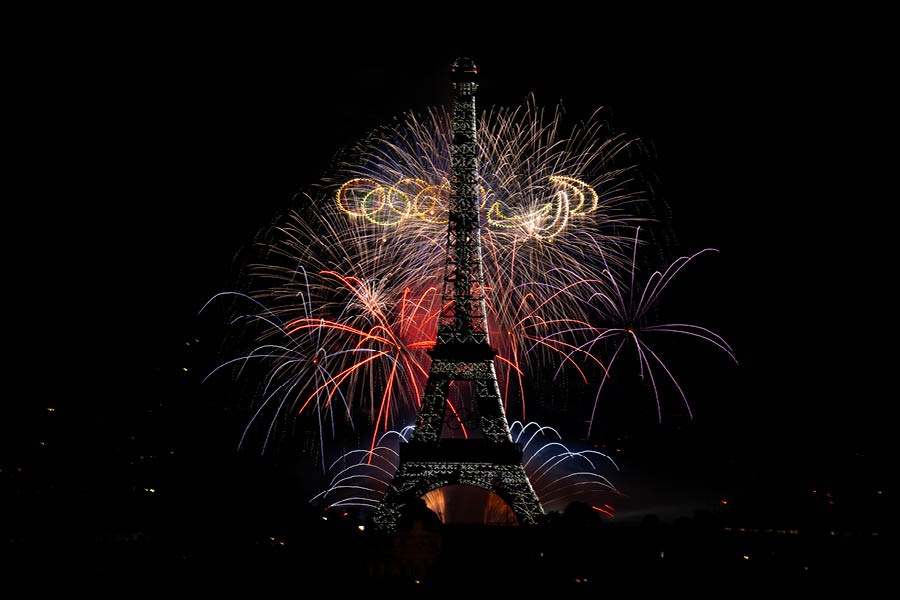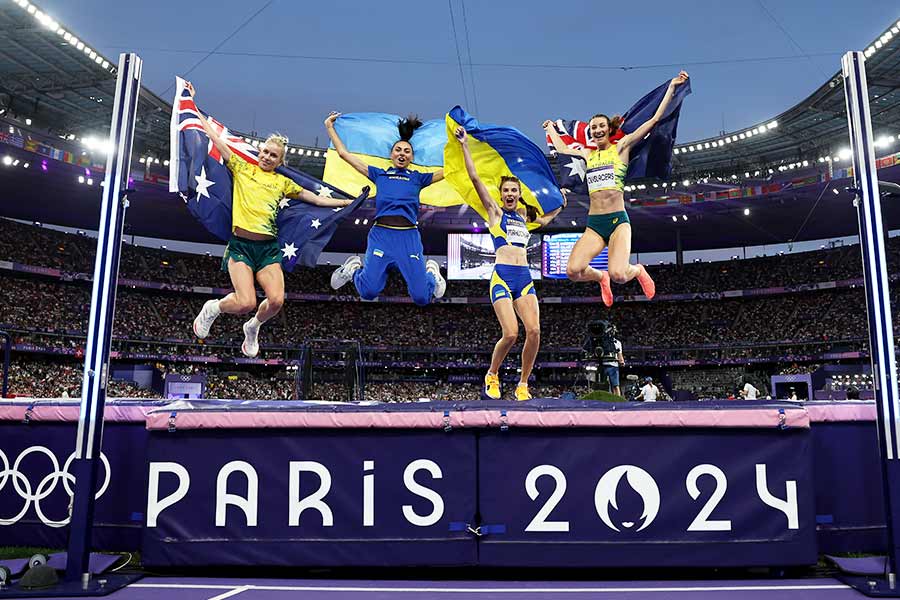“What’s the one thing you’ll remember about Paris 2024?” asked a Brazilian radio journalist, attempting to document my thoughts as a resident of Paris covering the Olympic Games.
I asked for time to sleep on it, promising an answer first thing next morning.
As I settled into my seat on the media shuttle from Stade de France to the Eiffel Tower, I started to relive the experiences I’d been jotting down over the past few weeks, hoping to unearth an answer.
‘Make the most of the Games… It’ll be magnificent!
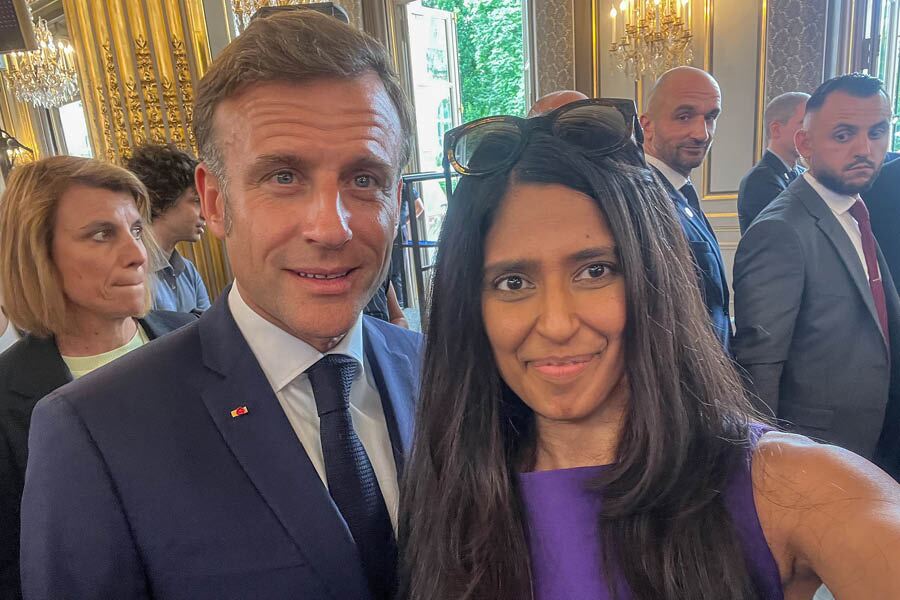
The author with French President Emmanuel Macron
“It’s going to be catastrophic!” exclaimed my neighbour three weeks ago, on learning that I’d be in Paris for the Olympics. “Me… I go,” he boasted, loading every square centimetre of his car with supplies, before driving off to the south of France. “Courage [to you],” he signed off!
If there’s anything I’ve learnt about the French in my decade of living here, it’s that they have tremendous inertia to change. Anything that as much as challenges, let alone disrupts their existing reality, encounters fierce resistance.
My residential social media groups were buzzing with cries of “la honte!” (shameful) as unprecedented security measures saw Parisian streets by the Seine being barricaded off to the public for the entire week leading up to the opening ceremony of the Games. If one lived or worked in the area, one had to request a special QR code from the police, who were stationed every 100 metres. For most Parisians, the Olympics were the ultimate invasion of their liberty and the general mood was that of utter disgust toward the Games, the French government and the world.
But for those with media accreditation, the Olympics would prove to be the time of our lives. Imagine having exclusive, unrestricted access not just to a place, but to an entire city — a city like Paris — in the middle of summer!
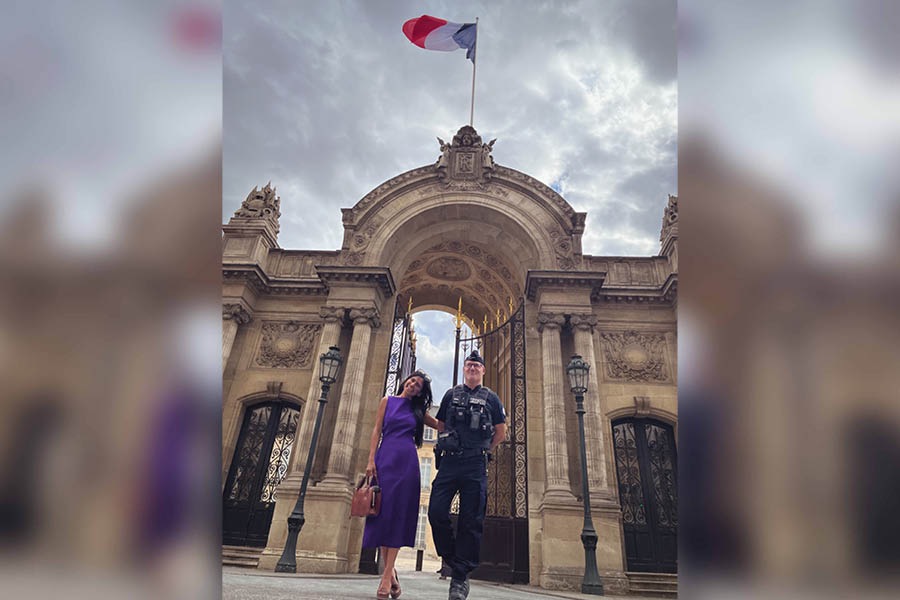
The author posing with a local policeman at the entrance of the Grand Palais
“Cricket?” asked a policeman at the Grand Palais entrance on checking my Indian credentials. I laughed, reminding him that cricket wasn’t an Olympic sport yet. The conversation lasted around 12 minutes, involving smiles and jokes, before I was led to the media entrance. Parisians know that this is not normal. Smiles are usually non-existent and laughs unheard of in this city when it comes to interactions between strangers.
A few days before the Games kicked off, I had opened my inbox to find the following mail: “The President of the Republic is pleased to invite you to an afternoon at the l’Elysee Palace to celebrate the spirit of Paris 2024.” Admittedly, I wasn’t too excited about it, probably because there was an endless list of things to do.
“It’s a proud moment to be invited by the President,” said my mum excitedly, completely unable to comprehend my indifference. I went, albeit grumpily.
Three hours into the afternoon, after having been briefly fascinated by the opulence and grandeur of the place, I went back to being grumpy, this time with an aching foot in 12cm heels, as we waited for President Macron, who, we were told, was running late. Finally, after what seemed like an eternity, he entered to a grand announcement and music befitting royalty, gave some speeches and casually interacted with the 100-odd media members.
“Call,” messaged my dad. “Can’t, busy,” I replied.
Deep in conversation with someone about a metre away, President Macron and I eventually made eye contact, before he started walking purposefully towards me with his hand outstretched. That was all the sign his security entourage needed to back away. “Thank you, Mr President, for your attention to detail,” I said, gratefully. The next five minutes were spent talking about India, yoga, Paris and, of course, taking selfies. His parting words were: “Profitez bien... Ca va etre magnifique (make the most of the Games… It’ll be magnificent!).”
Capturing Simone Biles courtesy… Simone Biles
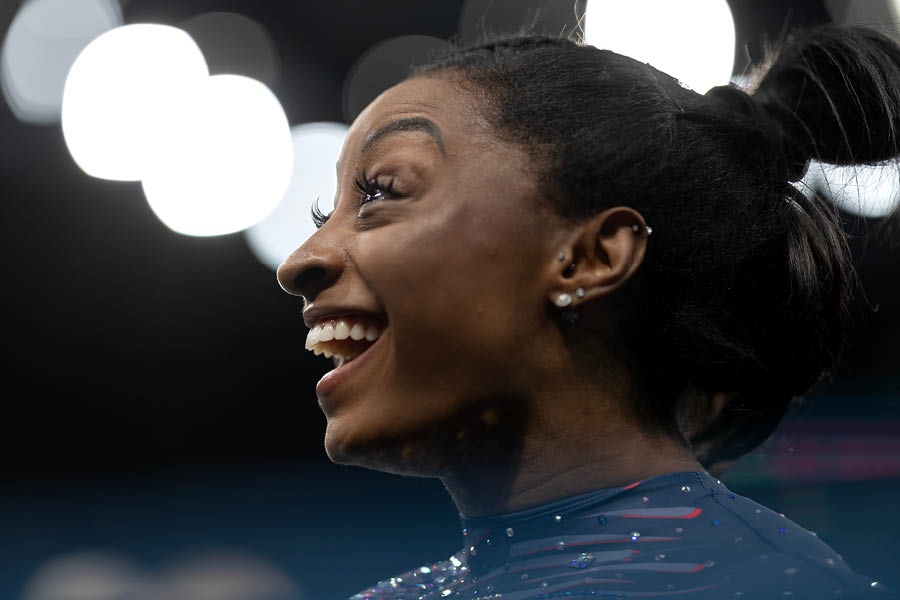
Simone Biles spotted the author and gave her time to click a memorable shot
Thanks to a tip from my wonderful colleague, Tim, I was made aware that a couple of days prior to the gymnastics final, there was something called the ‘podium’ — a dress rehearsal of sorts. Not many knew about it, which is why it was a fantastic opportunity for those that did, to be able to capture candid shots, as the gymnasts were going to be fairly relaxed.
Simone Biles was one of the most important storylines leading into the Games, following her withdrawal at the last edition. Her presence was as good a reason as any for me, in spite of a newly fractured toe, to pop some painkillers and head to the Bercy Hall to capture some of Biles’s magic on the beams.
I’m about half the height and a third of the weight of most of the other photographers. Not wanting to aggravate my toe, I stood about four metres away from the rest of the lot, flailing my arms in an attempt to catch the athletes’ attention, much to the photo-coordinator’s amusement. Since my face comes with subtitles, the disappointment must have been apparent. Simone Biles saw me pleading, made eye contact, nodded, and gently gestured for me to wait. She then turned to the crowd of yelling photographers and asked them all to calm down, taking charge of the situation.
“First, we look there,” she instructed her teammates, pointing in the general direction of all the photographers. “Then, we look there,” she proceeded, a few seconds later, pointing at their team photographer. “Oh no,” went my mind, “She won’t….” “And then,” she suggested, belting out her widest smile and turning in my direction, with the entire team following suit: “We look at her!” I clicked nervously, lowered my camera, placed my hand on my heart and mouthed “thank you” rather sheepishly. Biles nodded in acknowledgement. I might have had a broken toe, but I’m not exaggerating when I say that I had an extra spring in my step for days after that!
‘The stadium won’t be there anymore in a couple of months, but all of us will carry these memories’
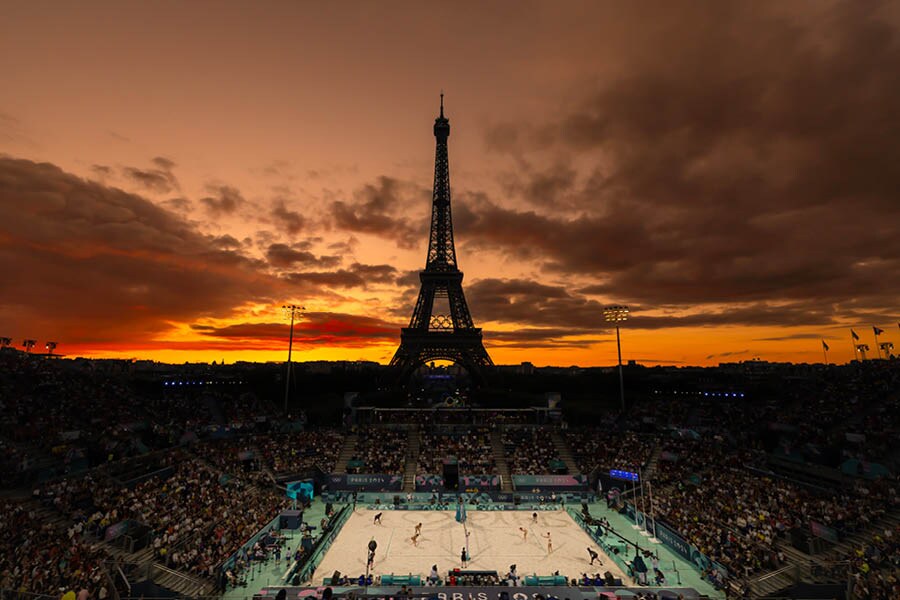
Sunset at the Eiffel Tower Stadium
I was jolted out of my archived thoughts by a beaming bus driver, who informed me that we had reached the destination. I made my way inside what was the most stunning venue for any sport I had seen — a beach volleyball court at the foot of the Eiffel tower. A perfectly bilingual volunteer, Clara, helped me with my suitcase and into my designated position. I was numbed by the beauty of the setting. As if to jolt me out of my stupor, the DJ galvanised the crowd. Picture tens of thousands raving to a Monster Block raised-hands choreography (which Clara taught me) and the rumbling of thousands of feet on the metal bleachers creating a literal earthquake, set against the backdrop of sunset at the Eiffel Tower. For the first time it felt that Paris was not only looking at us, but actually reaching out for a hug.
“We meet again,” a voice to my right interrupted. I could tell he was a photographer from his vest. “I’ll never forget you,” he continued, refreshing my memory. “I was sitting next to you when [Novak] Djokovic exploded, screaming and wildly chest thumping centimetres away from us, after defeating Matteo Berrettini in an empty Roland Garros stadium during Covid, remember? You were so sacred, I’ll never forget your face!”
“Isn’t it a beautiful thing,” I thought out loud to Clara, as she helped me carry my equipment back to the media room at the end of the evening: “How no one knows each other, and yet, we’ve all spent the last couple of hours chanting, cheering, synchronising and sharing this experience that’s bound us for life?”
“Totally,” she affirmed: “The stadium won’t be there anymore in a couple of months, but all of us will carry these memories.” We exchanged pins as mementos and I promised to send her a picture from the evening.
‘Every evening I walk through these doors… and I feel like I’m home’
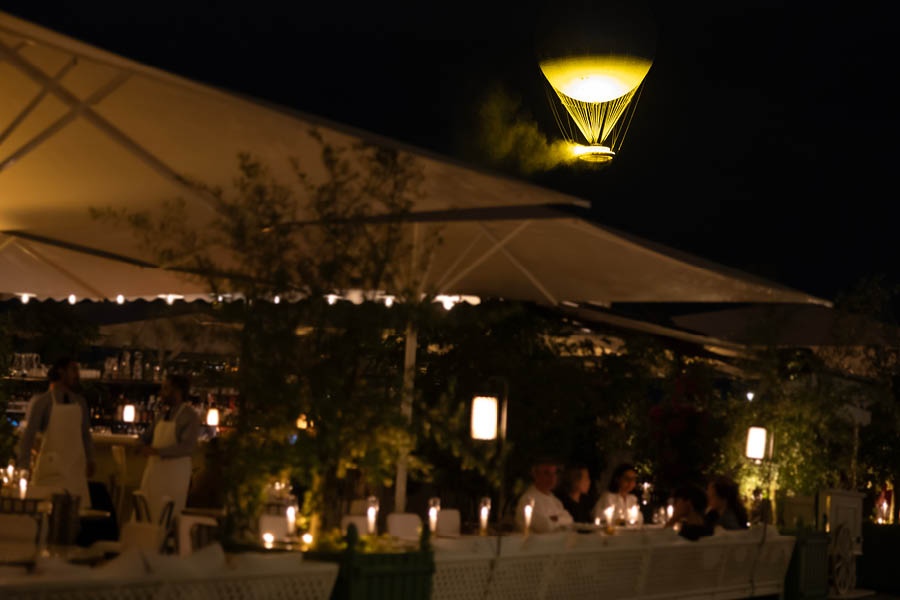
A restaurant at Paris’ Olympics cauldron
“Have you read Rene Fallet’s Paris au mois d'août?” asked my local baker, Clement, who’d been living the Games vicariously through my stories every morning.
“Nope, it sounds depressing!”
“It’s a bittersweet romance of a man called Henri, who’s forced to stay in a deserted Paris in the month of August, while his wife and kids go on holiday,” Clem explained patiently. “He has a summer romance with an English girl who’s visiting to cure a heartbreak, but at the end of August, she leaves, his family comes back and life goes back to normal.” Pause. “It’s a simple cliched story… it’ll make your heart ache for this man’s hopeful heart, who’s lived something extraordinary in Paris, even though he must go back to the mundane.” With a wise smile lurking at the corners of his mouth, he waited to see if I was able to connect the dots. I was, and soon after, I ordered a copy on Amazon. Later that evening, I was invited to the OLY House. It was the last chance to meet a friend who was leaving.
Situated in a historical monument on the prestigious 7th arrondissement of Paris, the OLY house is a ‘home’, a private club, a safe haven, if you please, for Olympians, past and present, and their families and friends to meet, enjoy and spend the duration of the Games together. I wasn’t quite sure what to expect as I hobbled through the cobbled courtyard, into a palatial room with ceiling frescoes — the gold of the opulent chandeliers offset against the silver of the Olympic flame — and then into a garden littered with deck chairs and giant screens.
Mark, a two-time British Olympian, former luger and self-proclaimed Indian at heart, explained, “Every evening I walk through these doors, Neha, and I feel like I’m home,” reclining further into his deck chair.
From the bourgeois Parisian streets, a few of us decided to extend the evening at the Puma house in the north of Paris. Entry to most of these houses were by invitation only (unlike the national houses where tickets could be purchased). The aim was to provide the sponsored athletes and national associations a safe space to relax and enjoy themselves without having to worry about optics.
The love of life, the joy of living
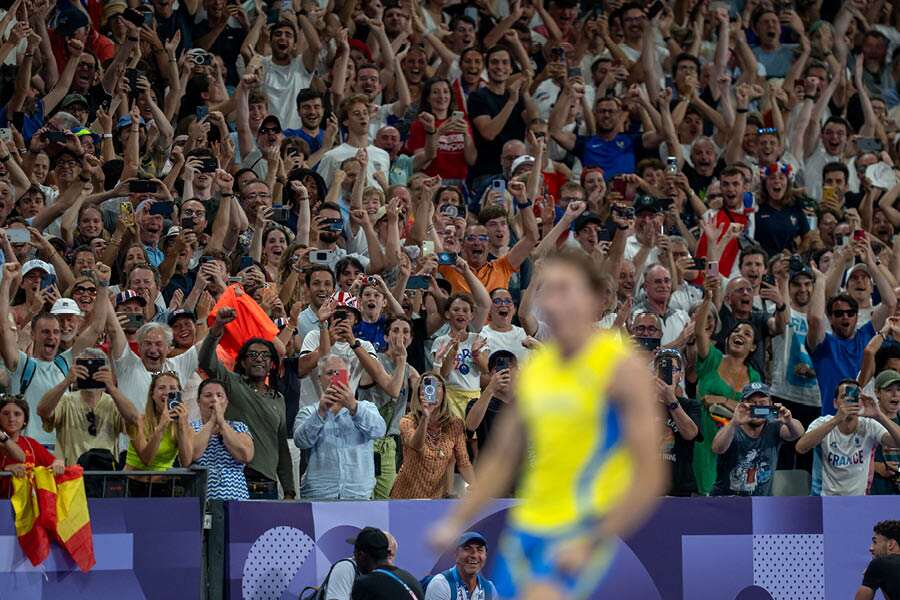
The crowd goes berserk as Armand ‘Mondo’ Duplantis breaks his own world record at the men’s pole vault event in Paris
We walked in past midnight to Phillip Starck-inspired interiors — athletes and trainees dancing to Sara perche ti amo, while cleats autographed by Usain Bolt proudly occupied centre stage in the showcase. As I poured myself a glass of Moscow Mule, my eyes fell on a coffee-table book by the bar. On the cover was a painting with abstract geometrical shapes creating a whirlwind of momentum — reminiscent of the Paris 2024 graphics.
“Where have I seen this painting?” I wondered, as I leaned in to read the fine print.
Rythme, Joie de vivre (roughly translating to “the love of life, the joy of living”) by Robert Delaunay. A wide smile lit my face, as I found the answer I’d been looking for all day. Three words so obvious and appropriate that I laughed out loud.
It had been there all along! Every single moment from the past three weeks — from the President’s labrador retriever, Nemo, defying orders to sunbathe in the perfectly manicured l’Elysee gardens, to Simone Biles talking about taking time off to come back a winner, from Clement reading incessantly for pleasure to policemen joining in games and dances, from athletes revelling in each other’s achievements to throwing themselves in the crowd, from the aquatic centre vibrating with the national anthems to little fans looking forward to swimming lessons, from the ringing of the bell that would be eternalised at Notre Dame to volunteers, fans, tourists wherever and whenever the eyes moved. Every corner of Paris had one thing in common — the love of life, the joy of living.
“Joie de vivre,” I answered the next morning, staring into a pair of eyes that mirrored my smile, knowing exactly what I meant.
Neha Ganeriwal is a senior photojournalist based out of Paris, whose work has been featured by several international news agencies and publications

